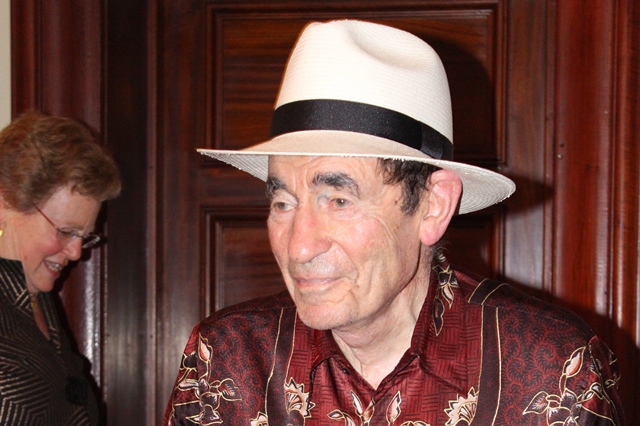“I would try to keep myself going by inventing games, and I would sing songs. My favourite (song) was ‘Always.’ I’ll be living here always, year after year, always in this little cell, that I know so well, I’ll be living swell, always, always… and I would sort of waltz around, singing to myself and be amused with the fact that this song was keeping my spirit up”.
These were the personal thoughts of Albie Sachs, SA anti-apartheid activist, attorney and former judge, which he shared at DUT during the screening of his film: Soft Vengeance and the New South Africa at the University’s City Campus this week. The personal thoughts were on his life journey’s fight against apartheid in the 60s and how he kept sane during his imprisonment in solitude during the apartheid regime.
American filmmaker and former lawyer Abby Ginzberg, who was also in attendance at the screening, directed and produced the movie on the renowned activist (Albie Sachs) which focuses on him from his early teen years in the 1950s up through the present day, highlighting his journey from defying pass laws, being unlawfully imprisoned, going into exile, being blown up by a car bomb which cost him his right arm and the sight of one eye, to writing the new constitution as one of the first 11 judges appointed to the new Constitutional Court of South Africa. Ginzberg has been producing and directing award-winning documentary films since 1983.
Her work has focused on character-driven stories, racial and gender discrimination and social justice issues. Her work has been shown in film festivals and broadcast on public television networks nationally and internationally. Ginzberg said she met Sachs in the 70s while she was still in law school.
The two forged a lasting friendship through the years. Talking about her intention of making the movie, she said her aim was to tell the story about the South African history. “But part of my goal was to say give me 80 minutes of your time and you can learn pretty much all you need to know about the struggle. So in that way, I think it fills a niche, a need to help particularly young people,” she added.
The film also tells the story behind the construction of the Constitutional Court Building in which Sachs played a critical role. He was among those who recommended that the new court building be erected in the heart of the prison where both Mahatma Gandhi and Nelson Mandela had been imprisoned and be designed to represent enlightenment and hope where there had once been despair.
“The building was designed to be a continuing part of the freedom struggle and to epitomize, in its very openness and sense of humaneness, the values of human dignity, equality and freedom that lay at the core of the constitutional endeavour,” he said. Students, keen to learn more about Sachs’ struggles during apartheid, questioned him about the Truth and Reconciliation Commission, asking him if it had achieved its goal of finding the truth behind the violence and human rights violations from perpetrators during the apartheid regime.
His answer was that some found their answers, gaining amnesty, but some answers were still not learnt. Sachs also spoke about the man who was responsible for the car bomb outside his house, Henri van der Westhuizen, who did own up at the TRC and gained amnesty. “He’s not my friend. I won’t phone him up and say let’s go to a movie together but if I’m sitting in a bus and he sits next to me I’ll say, ‘Oh Henri, how are you getting on?’,” said he said. When Sachs was asked by students of his thoughts on South Africa after 21 years of democracy, he said that the country has undergone tremendous transformation and the new generations needed to pave the way forward.
“I believe in this country today. What gives me an enormous sense of pride is the South African constitution, political parties can come and go but our constitution stays the same. The one thing you can’t take away from the South African people is that they always speak their minds. Our foundations are strong, elections free and fair and people have a choice to tick those ballad papers,” said Sachs. Sachs and Ginzberg will be touring all the universities in and around South Africa to showcase and discuss the movie.
For more information, go to http://www.softvengeancefilm.org
-Waheeda Peters
Pictured: Apartheid activist Albie Sachs and American filmmaker Abby Ginzberg at the screening of the movie Soft Vengeance and the New South Africa at DUT this week.


